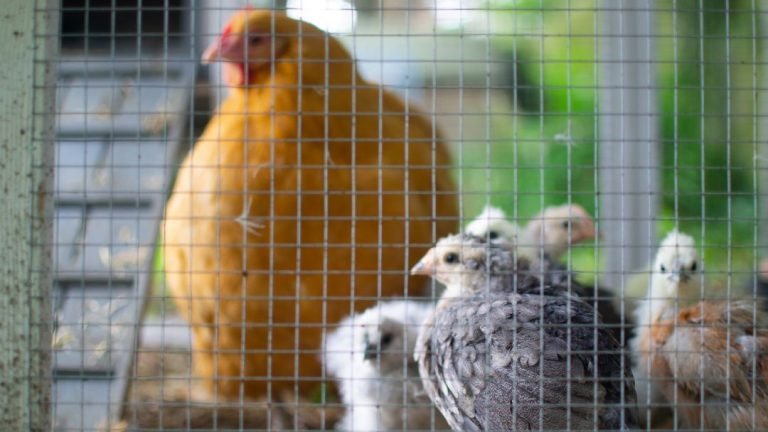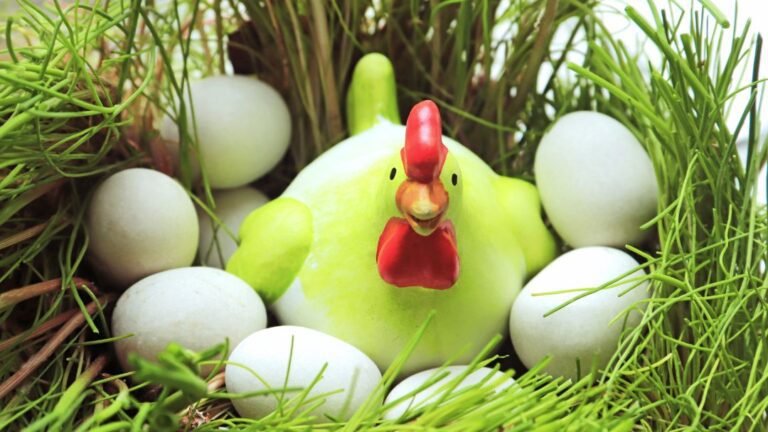Blood in chicken poop may be a sign of various health issues and should be addressed promptly. Blood in chicken poop can be alarming for backyard chicken keepers.
It is essential to understand the possible causes of this condition and take appropriate action. Whether you are a seasoned chicken owner or a beginner, being aware of the potential health issues is crucial for maintaining the well-being of your flock.
We will explore the common causes of blood in chicken poop and provide tips on how to address the issue. By understanding the underlying reasons and taking necessary precautions, you can ensure the health and happiness of your feathered friends. Let’s delve into the topic and gain insights on resolving this concerning matter.
Understanding The Health Risks Associated With Blood In Chicken Poop
Understanding the Health Risks Associated with Blood in Chicken PoopWhen it comes to backyard chicken farming or commercial poultry operations, chicken poop is an inevitable part of the equation. However, finding blood in chicken poop can be concerning, as it may indicate underlying health issues in the birds. But what does this mean for human health? In this article, we will delve into the potential health risks associated with blood in chicken poop and how it can impact human wellbeing.Salmonella Contamination: The Link Between Blood In Chicken Poop And Foodborne Illnesses
Salmonella is a bacteria commonly found in the intestines of chickens. When blood is present in chicken poop, it can be a red flag for potential salmonella contamination. Salmonella can cause foodborne illnesses when humans consume contaminated poultry products, leading to symptoms like diarrhea, stomach cramps, and fever.The connection between blood in chicken poop and salmonella contamination lies in the fact that blood can serve as a carrier for the bacteria. If the chicken is infected with salmonella, the bacteria can be present in their intestines and may contaminate the poop. This is why it is crucial to handle chicken products with care, ensuring proper cooking and hygiene practices to prevent the spread of salmonella.Campylobacter Infection: How Blood In Chicken Poop Can Transmit Infection To Humans
Campylobacter infection is another concerning health risk associated with blood in chicken poop. Similar to salmonella, campylobacter bacteria can reside in the intestines of chickens, leading to potential contamination of their poop. If the chicken is infected with campylobacter, their poop can contain the bacteria, making it crucial to handle it with caution.Consuming undercooked or raw chicken products contaminated with campylobacter can lead to campylobacteriosis in humans. Symptoms of this infection include diarrhea, abdominal pain, and fever. It is important to note that campylobacter is one of the most common causes of bacterial diarrhea worldwide, underscoring the significance of preventing contamination and ensuring proper cooking practices.E. Coli Outbreaks: Exploring The Connection Between Blood In Chicken Poop And Contaminated Produce
E. coli outbreaks are a recurring concern in the food industry, with contaminated produce being one of the main culprits. Though E. coli is commonly associated with contaminated beef, there is a lesser-known connection between blood in chicken poop and E. coli contamination.When chickens are raised in close proximity to produce fields, their poop can serve as a potential source of E. coli contamination. If the chicken has an E. coli infection, their poop can contain the bacteria, which may then be transferred to nearby crops through irrigation, runoff, or other means. This highlights the importance of proper waste management in poultry farms to prevent the spread of E. coli and subsequent contamination of produce.In conclusion, blood in chicken poop can be an indicator of potential health risks both for the birds themselves and for humans. Salmonella contamination, campylobacter infection, and E. coli outbreaks are just a few examples of the potential dangers associated with blood in chicken poop. By understanding these risks and taking necessary precautions, we can minimize the chances of foodborne illnesses and contribute to a safer food supply chain.Identifying The Signs Of Blood In Chicken Poop: A Guide For Poultry Owners
As a poultry owner, it’s important to closely monitor the health and well-being of your chickens. One of the signs that can indicate underlying health issues is blood in their poop. While it can be alarming to discover blood in your chicken’s droppings, it’s crucial to understand what it means and how to address the issue. In this guide, we will explore the various aspects of identifying blood in chicken poop, including examining its color and consistency, observing changes in behavior, and seeking professional assistance from an avian veterinarian if needed.
Color And Consistency: How To Detect Blood In Chicken Poop
When inspecting your chicken’s droppings, it’s important to pay close attention to the color and consistency. One of the indicators of blood in chicken poop is a reddish or maroon hue. This can range from a faint streak to more prominent specks throughout the droppings. Another telltale sign is the presence of blood clots or mucus-like strands in the feces. It’s crucial to note that sometimes the color may be disguised by other factors such as diet or medication, so it’s essential to observe any changes in conjunction with other symptoms.
Observing Changes In Behavior: Understanding The Signals Of Blood In Chicken Poop
While visual cues in the droppings are essential, observing changes in your chicken’s behavior can provide further insights into the presence of blood in their poop. Pay attention to any signs of lethargy, decreased appetite, or difficulty moving. Additionally, check for abnormal feather appearances, weight loss, or discomfort during egg-laying. These behavioral changes can be linked to various underlying health issues, including blood in chicken poop. By closely monitoring your chickens and noting these changes, you can provide important information to your avian veterinarian for an accurate diagnosis and treatment plan.
The Role Of The Avian Veterinarian: Seeking Professional Assistance For Diagnosing Blood In Chicken Poop
While you play a crucial role in monitoring your chicken’s health, it’s important to seek professional assistance from an avian veterinarian for a definitive diagnosis and appropriate treatment. A veterinarian specializing in avian medicine has the knowledge and experience to determine the underlying cause of blood in your chicken’s droppings. They will perform a thorough examination, possibly including blood tests and stool samples, to identify the specific issue and recommend an effective treatment plan. Remember, early detection and intervention can significantly impact the health and well-being of your chickens. Don’t hesitate to reach out to a qualified avian veterinarian for assistance when you observe signs of blood in your chicken’s poop.
Causes And Prevention Of Blood In Chicken Poop: Proactive Measures For Poultry Health
Ensuring the overall health and well-being of your flock is crucial for any chicken owner. One common issue that can cause concern is the discovery of blood in your chicken’s poop. While this may seem alarming, understanding the causes of blood in chicken poop and implementing proactive measures can help maintain the health of your poultry. In this article, we will explore three main factors that can contribute to blood in chicken poop: nutritional imbalance, infectious diseases, and parasitic infestations. By addressing these factors and taking preventive measures, you can minimize the risk of blood in your chicken’s poop and promote their overall health.
Nutritional Imbalance: Addressing Dietary Factors That Lead To Blood In Chicken Poop
A well-defined and balanced diet is essential for maintaining the overall health of your chickens. Nutritional imbalances can occur due to various factors such as inadequate feeding, improper formulation of feed, or deficiencies in essential nutrients. These imbalances can lead to digestive issues, resulting in blood in chicken poop.
To address this issue, it is important to ensure that your chickens are receiving a balanced diet that meets their nutritional requirements. Here are some proactive measures you can take:
- Provide a balanced feed: Consult a poultry nutritionist or veterinarian to formulate a feed that meets the specific needs of your flock.
- Ensure access to fresh water: Water is a crucial component of a chicken’s diet. Make sure your chickens have access to clean, fresh water at all times.
- Offer appropriate supplementation: In some cases, supplementing their diet with vitamins or minerals may be necessary to address any deficiencies.
Infectious Diseases: Implementing Biosecurity Measures To Prevent Blood In Chicken Poop
Chickens are susceptible to various infectious diseases that can cause internal damage and result in blood in their poop. Controlling the spread of these diseases through strong biosecurity measures is essential to maintain the health of your flock.
Here are some proactive measures you can take to minimize the risk of infectious diseases:
- Isolate sick birds: Immediately separate any sick chickens from the rest of the flock to prevent the spread of disease.
- Keep the coop clean: Regularly clean and disinfect the chicken coop and surrounding areas to minimize the presence of disease-causing pathogens.
- Prevent contact with wild birds: Wild birds can carry and spread diseases to your chickens. Use physical barriers or netting to prevent direct contact.
- Practice good hygiene: Maintain proper personal hygiene when handling your chickens to prevent disease transmission.
Parasitic Infestations: Taking Steps To Minimize The Risk Of Blood In Chicken Poop
Parasitic infestations, such as worms or mites, can cause internal damage and bleeding in chickens. Preventing these infestations and promptly treating any outbreaks is crucial for the overall health of your flock.
Here are some proactive measures you can take to minimize the risk of parasitic infestations:
- Implement a regular deworming schedule: Consult a veterinarian to develop a deworming plan suitable for your flock’s needs.
- Maintain a clean environment: Regularly clean the chicken coop and nesting area to reduce the chances of parasitic infestation.
- Inspect chickens regularly: Keep an eye out for signs of parasitic infestations, such as weight loss, pale combs, or excessive itching.
- Separate and treat affected birds: If one of your chickens is diagnosed with a parasitic infestation, isolate them from the rest of the flock and administer appropriate treatment.
Effective Treatment Options For Blood In Chicken Poop: Restoring Poultry Health
Blood in chicken poop can be a worrisome sign for poultry owners, as it indicates underlying health issues that require prompt attention. Fortunately, there are various effective treatment options available to restore poultry health and address the underlying causes of blood in chicken poop. From medication and supplements to natural remedies and follow-up care, this article will guide you through the process of restoring your chicken’s well-being.Medication And Supplements: Administering The Right Treatment For Blood In Chicken Poop
When it comes to treating blood in chicken poop, the use of appropriate medication and supplements can play a crucial role in restoring your poultry’s health. Here are some commonly used options:1. Antibiotics:
Bacterial infections can cause blood in chicken poop. Administering antibiotics prescribed by a veterinarian can help combat these infections and restore intestinal health.
2. Probiotics:
Probiotics are beneficial bacteria that promote healthy gut flora. Adding probiotic supplements or feed additives to your chicken’s diet can improve digestion and reduce the risk of blood in chicken poop.
3. Dewormers:
Intestinal parasites can lead to blood in chicken poop. Using dewormers specifically designed for poultry can effectively eliminate these parasites and restore poultry health.
Natural Remedies: Exploring Alternative Approaches To Treating Blood In Chicken Poop
If you prefer a more natural approach to treating blood in chicken poop, there are several alternatives you can explore. While it’s important to consult with a veterinarian before trying any natural remedies, here are a few options to consider:1. Herbal Supplements:
Certain herbs, such as garlic, oregano, and thyme, have natural antimicrobial properties that can help combat bacterial infections in chickens. Introducing these herbs into your chicken’s diet may aid in restoring intestinal health.
2. Apple Cider Vinegar:
Adding a small amount of raw, unpasteurized apple cider vinegar to your chicken’s water can improve digestion and boost overall gut health, potentially reducing the occurrence of blood in chicken poop.
3. Diatomaceous Earth:
Diatomaceous earth, a natural substance made from fossilized remains of tiny aquatic organisms, can help control parasites in chickens. When administered properly, it may contribute to minimizing blood in chicken poop.
Follow-up Care: Monitoring Poultry Health After Treating Blood In Chicken Poop
Once you have treated the blood in your chicken’s poop, it’s essential to provide follow-up care to ensure their long-term health. Here are a few key steps to take:1. Quarantine:
If you have multiple chickens, consider quarantining the affected bird to prevent the spread of infections or parasites to others in the flock.
2. Observation:
Monitor your chicken closely for any signs of recurring blood in their poop. If the issue persists or worsens, consult with a veterinarian for further evaluation and guidance.
3. Maintain a Healthy Environment:
Ensure your chicken coop or housing is clean, well-ventilated, and free from potential sources of stress or contamination. This helps minimize the risk of health issues and supports overall poultry well-being.
By following these effective treatment options and providing proper care, you can restore your chicken’s health and alleviate the concerns associated with blood in chicken poop. Remember to collaborate with a veterinarian throughout the process to ensure the best possible outcome for your poultry.Ensuring A Healthy Environment For Poultry: Best Practices For Chicken Coop Maintenance
htmlWhen it comes to raising poultry, maintaining a healthy environment in the chicken coop is crucial for the overall well-being and productivity of your flock. By implementing the best practices for chicken coop maintenance, you can create optimal conditions that promote good health and prevent potential issues such as blood in chicken poop. In this article, we will explore three key areas of coop maintenance to ensure a healthy environment for your chickens: proper cleaning and sanitization, ventilation and temperature control, and raising disease-resistant chicken breeds.
Proper Cleaning And Sanitization: Maintaining Hygiene In The Chicken Coop
Regular cleaning and sanitization of the chicken coop are essential for maintaining proper hygiene. By keeping a clean environment, you can reduce the risk of bacterial and parasitic infections, including those that might cause blood in chicken poop. Here are some key steps to follow:
- Clean out the coop regularly, removing any soiled bedding and feces.
- Disinfect the coop using a poultry-safe sanitizing solution. Be sure to follow the instructions provided by the manufacturer.
- Ensure that feeders and waterers are cleaned and sanitized regularly.
- Inspect the coop for signs of pests and take appropriate measures to control their presence.
By implementing proper cleaning and sanitization practices, you can provide your chickens with a clean and healthy living environment that minimizes the chances of blood in their poop.
Ventilation And Temperature Control: Creating Optimal Conditions For Poultry Health
Adequate ventilation and temperature control are crucial for maintaining optimal conditions in the chicken coop. Poor ventilation and extreme temperature fluctuations can lead to stress, respiratory issues, and other health problems. Here are some tips to ensure proper ventilation and temperature control:
- Install vents or windows that can be opened and closed to allow for proper airflow.
- Monitor and adjust the coop’s temperature to maintain a comfortable range for the chickens. Supplemental heat or cooling may be necessary in extreme weather conditions.
- Position the coop to avoid direct sunlight and strong drafts.
- Regularly check ventilation systems and make necessary repairs or replacements.
By providing adequate ventilation and maintaining a suitable temperature, you can create a favorable environment for your chickens, reducing the likelihood of blood in their poop and promoting overall poultry health.
Raising Disease-resistant Chicken Breeds: Choosing The Right Birds For Your Flock
One effective way to prevent diseases and related issues in your flock, such as blood in chicken poop, is by choosing disease-resistant chicken breeds. These breeds possess genetic traits that make them less susceptible to common poultry ailments. Consider the following when selecting your poultry:
| Considerations for Disease-Resistant Chicken Breeds | Examples of Resilient Breeds |
|---|---|
| Flock size and space availability | Rhode Island Red, Sussex, Plymouth Rock |
| Climate compatibility | Easter Egger, Australorp, Wyandotte |
| Desired egg production or meat quality | Leghorn, Orpington, Cornish |
When choosing chicken breeds, consider your specific requirements and consult with local experts or experienced poultry farmers for personalized advice. By selecting disease-resistant breeds that are well-suited to your environment, you can minimize the risk of diseases and bloody feces.
Ensuring a healthy environment for poultry requires consistent effort and attention to detail. By following proper cleaning and sanitization practices, ensuring adequate ventilation and temperature control, and choosing disease-resistant chicken breeds, you can create an environment that promotes the well-being of your flock. Implement these best practices for chicken coop maintenance and provide your chickens with the care they need to thrive.
Conclusion
To summarize, if you notice blood in your chicken’s droppings, it can be alarming. However, it’s essential not to panic and take immediate action. Consult a veterinarian to diagnose the underlying cause, as it could be a sign of various issues ranging from coccidiosis to internal injuries.
Maintaining a clean and stress-free environment for your poultry, providing a balanced diet with clean water, and regular health check-ups are crucial to ensure the overall well-being of your chickens. Remember, early detection and proper care can prevent further complications and promote their health and happiness.




